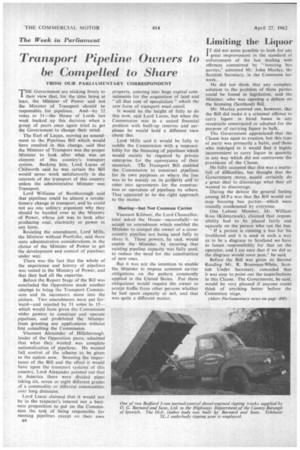Transport Pipeline Owners to be Compelled to Share
Page 38

If you've noticed an error in this article please click here to report it so we can fix it.
FROM OUR PARLIAMENTARY CORRESPONDENT
THE Government are sticking firmly to their view that, for the time being at least, the Minister of Power and not the Minister of Transport should be responsible for pipelines. And—by 52 votes to 31—the House of Lords last week backed up this decision when a group of peers once again tried to get the Government to change their mind.
The Earl of Lucan, moving an amendment to the Pipelines Bill which would have resulted in this change, said that the Minister of Transport was the proper Minister to look after what was an element of this country's transport system. Backing him, Lord Lucas of Chilworth said he was certain the Bill would never work satisfactorily in the interests of the transport of this country unless the administrative Minister was Transport.
Lord Williams of Barnborough said that pipelines could be almost a revolutionary change in transport, and he could not see one solitary argument why they should be handed over to the Ministry of Power, whose job was to look 'after producing coal, electricity or power in any form.
Resisting the amendment, Lord Mills, the Minister without Portfolio, said there were administrative considerations in the choice of the Minister of Power to get the development and control of pipelines under way.
There was the fact that the whole of the experience and history of pipelines was vested in the Ministry of Power, and that they had all the expertise.
Before the Report Stage of the Bill was concluded the Opposition made another attempt to bring the Transport Commission and its successors more into the picture. Two amendments were put forward—and rejected by 51 votes to 15— which would have given the Commission wider powers to construct and operate pipelines, and prohibited the Minister from granting any applications without first consulting the Commission.
Viscount Alexander of Hillsborough, leader of the Opposition peers, admitted that what they wanted was complete nationalization of pipelines. He wanted full control of the scheme to be given to the nation now. Stressing the importance of the Bill and the effect it would have upon the transport systems of this country, Lord Alexander pointed out that in America there were divided pipes taking six, seven or eight different grades of a commodity or different commodities over long distances.
Lord Lucas claimed that it would not be in the taxpayer's interest nor a business proposition to put on the Commission the task of being responsible for running pipelines except on their own B4 property, entering into huge capital commitments for the acquisition of land and "all that cost of speentation " which the new form of transport must entail.
It would be the height of folly to do this now, said Lord Lucas, but when the Commission was in a sound financial position with built-up reserves and surpluses he would hold a different view about this.
Lord Mills said it would be folly to saddle the Commission with a responsibility for the financing of pipelines which would mainly be required by private enterprise for the conveyance of their materials. Tfte Transport Bill enabled the. Commission to construct pipelines for its own purposes or .where the line was to be mainly on its property and to. enter into agreements for the construction or operation of pipelines by others. That appeared to be the right approach to the matter.
Sharing—but Not Common Carrier Viscount Kilmuir, the Lord Chancellor, later asked the House—successfully—to accept an amendment which enabled the Minister to compel the owner of a crosscountry pipeline not being used fully to share it. These powers, he said, Would enable the • Minister, by ensuring that existing pipeline capacity was fully used, to reduce the need for the construction of new ones.
But it was not the intention to enable the Minister to impose common carrier obligations on the pattern commonly applied in the United States. For these obligations would require the owner to accept traffic from other persons whether he had spate capacity or not, and that was quite a different matter.




















































































































